Current Affairs 25 Sep 2023
Today’s News
Multiple entry, exit option in higher studies may not suit India: House panel
(Current Affairs 25 Sep 2023 |Relevant for GS paper-2)
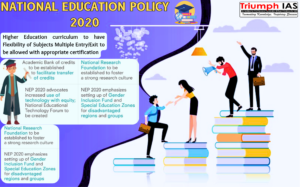
- After several organisations of students and teachers raised objections to the option of multiple entry and multiple exit (MEME) in the National Education Policy (NEP), the Parliamentary Standing Committee on Education, has advised the Centre to hold discussions with all stakeholders.
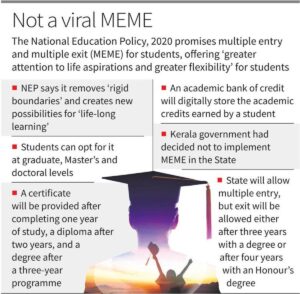
- The panel, in a report titled “Implementation of the National Education Policy, 2020 in higher education”, said Indian institutions were likely to face several issues in implementing this system.
- The report was tabled in both Houses of Parliament during the recently concluded Special Session. The NEP proposes multicentre and multi exit options for the students in higher education.
- The panel said while the MEME looked like a flexible system, which was being operated by Western educational institutions effectively, it might not work well in the country.
Aadhaar unreliable in ‘hot, humid’ India: Rating agency
(Current Affairs 25 Sep 2023 | Relevant for Prelims, GS paper-2)
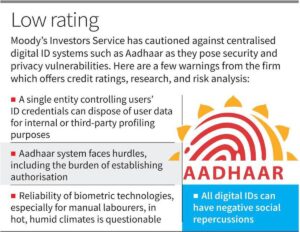
- Global rating major Moody’s Investors Service has flagged concerns about security and privacy vulnerabilities in centralised identification systems such as India’s Aadhaar programme.
- The Aadhaar system enables access to public and private services, with verification through fingerprint or iris scans and alternatives such as onetime pass codes (OTPs).
- “The Unique Identification Authority of India (UIDAI) administers Aadhar, aiming to integrate marginalized groups and expand welfare benefits access… The system often results in service denials, and the reliability of biometric technologies, especially for manual laborers in hot, humid climates, is questionable,”
- The rating agency’s remarks assume significance in view of the government’s adoption of Aadhaar for routing direct benfit transfers to beneficiaries of official welfare schemes, and in particular, the diktat to mandate Aadhaar based payments for labourers under the Mahatma Gandhi National Rural Employment Guarantee Scheme (MGNREGS).
- In a report on “Decentralized finance and digital assets” issued on Saturday, Moody’s acknowledged Aadhaar as “the world’s largest digital ID program” that assigns unique numbers to over 1.2 billion Indian residents.
Back to basics
- The Aadhaar card is a 12-digit unique number issued by the Unique Identification Authority of India (UIDAI).
- It contains biometric information, such as fingerprints and iris scans, along with demographic information, including individuals’ addresses and date of birth.
- The Aadhaar card serves as proof of identity and is valid anywhere in India for any identification purposes. Having an Aadhaar card is compulsory while applying for a new PAN card or filing Income tax returns.
- Indians and NRIs can apply for an Aadhaar Card. However, according to the Aadhaar act 2016, any individual must stay in India for 182 days or more in the year immediately preceding the date of enrolment application.
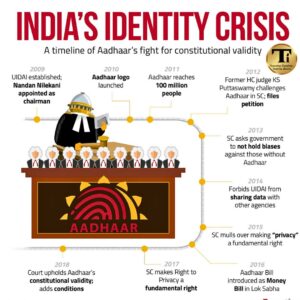
- The UID number of the Aadhaar card is unique for each individual and remains valid for them for a lifetime.
- Aadhaar enrolment is completely free from any charges.
- In the case of multiple enrolments, only one Aadhaar number is generated, while others are dismissed as duplicates.
- UIDAI offers several online services like checking Aadhaar enrolment status, updating address, locking/unlocking biometric details, etc.
- Cardholders can download a digital copy of their Aadhaar card to use for various government verifications.
An economic corridor, the Israel link and the geopolitics
(Current Affairs 25 Sep 2023 |Relevant for GS paper-2)

- The 2023 summit of the G20 under India’s presidency went exceptionally well given the group’s limited economic approach to the complex issues that the world faces, from climate change and underdevelopment, wealth concentration and poverty and, most critically for our times, falling democratic norms and principles of peace.
- India’s remarkable success at the summit this year, in early September, was captured by the global press, except in China, for various outcomes such as the inclusion of the African Union in the G20, a tangible offer of clean energy through a bio fuel alliance, increasing substantial aid for Asia Africa, an economic corridor that connects India, West Asia and Europe using an ambitious rail and shipping link, and the Delhi Declaration which was a joint statement of all the group.
- The joint statement called the Delhi Declaration is newsworthy because of the fractured international order and power struggles between India and the United States with China or the U.S. with Russia.
- Despite the absence of China’s President Xi Jinping and Russian President Vladimir Putin at the summit, India still got their agreement for the declaration which sums up the achievement. Substantially speaking, the statement is pareve (the Hebrew word for characterless things; read banal here) as it does not name Russia for aggression against Ukraine; but it does evoke the United Nations charter and principles of territorial sovereignty.
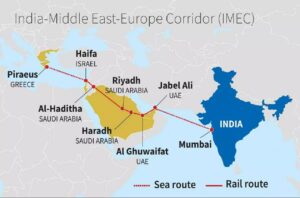
- An Indian official revealed the recipe for this over applauded collective statement: “India needed a text that had something for everyone, so that each member can go back with a win.”
- But the boldest outcome, and unanticipated by many, was the announcement of the economic corridor (the “India Middle East Europe Economic Corridor”), of a rail ship route, to transport goods to Europe from India via the United Arab Emirates Saudi Arabia Jordan Israel
- In its report on the G20, Arab News found that ‘India’s G20 leaders’ summit had an unprecedented Middle Eastern Presence’. India ‘set a precedent in G20 history by inviting the most Middle Eastern countries ever to take part as guests in the group’s key summit’, and one wonders why Israel, India’s strategic partner also from the region, was not given such an invitation.
- It is all the more perplexing when the economic corridor was to be announced at the same summit and Israel is a part of the plan. Mr. Modi and Mr. Netanyahu share a good friendship. Perhaps factors such as a meet between Saudi Arabia’s Crown Prince Mohammed bin Salman and Mr. Netanyahu may have been impossible unless there was diplomatic normalisation.
- Saudi Arabia is willing to end the diplomatic boycott of Israel. It is a historical change because such an acceptance of Israel by the most important, religiously speaking, Muslim country will help Israel with other countries such as Pakistan (already willing), Indonesia and Malaysia.
- For such a change, Saudis demand that Israel commits to the two state solution and the wellbeing of the Palestinian people, even if the occupation does not end soon. Currently, on the sidelines of the UN General Assembly, Saudi Arabia, in partnership with the Arab League and the European Union, has joined forces with Egypt and Jordan to launch a ‘Peace Day Effort’ aimed at incentivising Israelis and Palestinian leaders to compromise.
- Israel Palestine peace is a very challenging aim and given the rise of extremism on both sides, it appears all the more impossible. Saudi Arabia is aware of it and is still interested in having deliberations to walk smoothly among Arabs and other Muslims while working with the Biden administration to make peace with the State of Israel.
Taking India back to the drawing board
(Current Affairs 25 Sep 2023 |Relevant for GS paper-2)
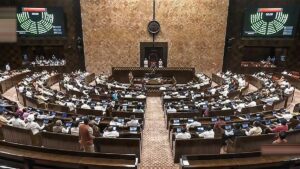
- Its political motivations aside, the Constitution (One Hundred and Twenty Eighth Amendment) Bill, 2023, which promises 33% reservation for women in the Lok Sabha, and in the Legislative Assemblies of States and the National Capital Territory of Delhi, sheds the spotlight on another crucial aspect of representative democracy — the delimitation of electoral constituencies.
- Given their almost festive nature in India, elections are traditionally considered to be the primary site where democracy translates into action. Equally significant is the carving out of the boundaries of electoral constituencies, an issue that has implications for adequate representation of voters’ interests as well as the number of members from each State who find space in the Parliament.
- Since the 1970s, there has been no change in the number of Lok Sabha seats. The Constitution (Forty Second Amendment) Act, 1976 froze the delimitation of Lok Sabha constituencies as per the Census of 1971, up to the Census which was to be conducted in 2001. However, in 2001, the day of reckoning was pushed further to 2026.
- This was done through an amendment to Article 82 by the Constitution (Eighty Fourth Amendment) Act. While the boundaries of electoral constituencies were redrawn in 2002, there was no change in the number of seats in the Lok Sabha.
- Article 81 of the Constitution says that each State gets seats in the Lok Sabha in proportion to its population. The freeze on delimitation effected in 1976 was to allay the concerns of States which took a lead in population control and which were faced with the prospect of reduction of their number of seats in the Lok Sabha.
- The exercise of delimitation also implicates the constitutional values of federalism and representation of States as consolidated units.
- Given this context, the question of delimitation necessarily has serious implications for both the individual voter as well as the States. The southern States run the risk of losing some of their seats in Parliament once the delimitation exercise is completed based on current population figures.
- The new Parliament building appears ready to house over 800 MPs in the Lok Sabha. How these MPs will be spread out across India’s electoral constituencies, and how many people each MP will represent, are questions that beg urgent answers.
- The freeze in 1976 was necessitated by States’ apprehensions embedded in the consequences of their population control measures and widely differing fertility rates. Such concerns hold good even today.
- The delimitation of constituencies will need answers to certain vexed questions. The first question might seem more logistical than anything else, where should the population figures come from to inform the exercise of delimitation? The 2021 Census was pushed courtesy of the COVID19 pandemic, and the Union Home Minister has indicated that the next Census and
Subsequent delimitation will be conducted after the 2024 Lok Sabha polls.
- Even more vexed are the qualitative concerns that will determine how boundaries of electoral constituencies will be redrawn. If done entirely in terms of proportion of population, the redrawing of constituencies would yield more seats to States in the north, given their higher population.
- The recently concluded delimitation in Assam, ahead of the 2024 Assembly elections, witnessed widespread concerns around how altering the boundaries of certain districts and renaming certain constituencies can have a potentially acute impact on the representation of specific communities.
- That is all the indication needed to start a robust conversation around delimitation sooner than later, so that lifting of the freeze on allocation of Lok Sabha seats does not have to be pushed ahead further.
How the rising influence of ethnic Indians causes frictions in India Canada ties
(Current Affairs 25 Sep 2023 |Relevant for GS paper-2)
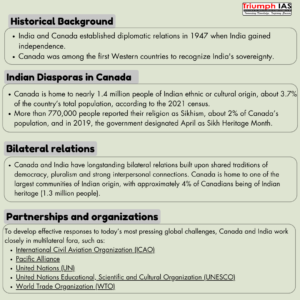
- On September 19, Canadian Prime Minister Justin Trudeau stated that his government is investigating possible links between the Indian government and the assassination of Khalistan Tiger Force chief Hardeep Singh Nijjar in Canada. This statement has escalated tensions between India and Canada with trade talks paused and diplomats fired.
- The ethnic Indian community, including the Sikhs, plays an important role in Canada’s public life. There are currently some ethnic Indians in Prime Minister Justin Trudeau’s cabinet. At the press conference, Mr. Jaishankar mentioned Canada’s indulgence of Khalistani elements (he did not use the word, but that is clearly what he had in mind) and aptly attributed it to ‘vote bank’ politics.
- It is the ethnic Indian, and, in this case, not restricted to a Khalistani‘vote bank’ that had led Mr. Trudeau to comment on the farmers’ agitation which was a purely domestic Indian issue.
- Mr. Jaishankar’s comments on Canadian attitudes to ethnic Indians provide an occasion to consider the Indian political class’s approaches towards the diaspora which has gained political, financial and professional success in many countries.
- The latest illustration of this phenomenon was Mr. Modi’s diaspora rally during his recent visit to Australia which was attended by Australian Prime Minister Anthony Albanese.
- Another significant issue which Mr. Jaishankar addressed during the media briefing related to the remarks of Jody Thomas, Canada’s National Security and Intelligence Adviser.
- The harsh reality of the current Canadian political situation is that Mr. Trudeau is critically dependent on the New Democratic Party (NDP) for his government’s survival and Jagmeet Singh, the NDP leader, is a committed Khalistan sympathiser.
- Bilateral ties are passing through difficult times but cooperation in many areas continues. One eye catching one is the Cannabis medicine project.
Combing operations held in Mukurthi National Park, adjoining areas
(Current Affairs 25 Sep 2023 |Relevant for Prelims)
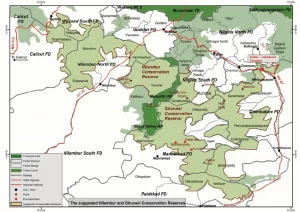
The Forest Department has been conducting combing operations in the Mukurthi National Park (MNP) and adjoining forest areas to ensure that there was no illegal movement of people and poachers.
Back to basics
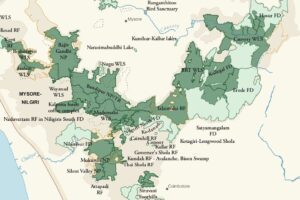
- The park was notified on 07th November 1990 and initially was known as Nilgiri Tahr National Park.
- Area and Location
- This park is a part of Nilgiri Bio Reserve, first Bio Reserve of India and is situated on western side of Nilgiris Plateau.
- It has an area of 78.46 sq. km with Silent Valley National Park and Mudumalai National Park lying on its borders.
- It belongs to the Biographic zone of Western Ghats.
Related Blogs…
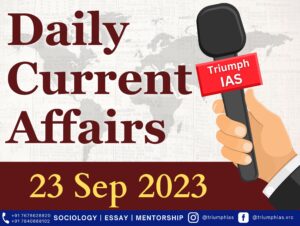 |
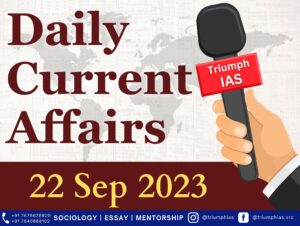 |
GS Related Practices Question…
To master these intricacies and fare well in the Sociology Optional Syllabus, aspiring sociologists might benefit from guidance by the Best Sociology Optional Teacher and participation in the Best Sociology Optional Coaching. These avenues provide comprehensive assistance, ensuring a solid understanding of sociology’s diverse methodologies and techniques.
Current affairs 25 September 2023, Current affairs 23 September 2023, Today news, Today news GS, Today news upsc, Today news and views, Today news 2023, Today news Current affairs September 2023, Current affairs news, Current affairs book pdf, Current affairs best blog, Current affairs for UPSC, Current affairs 2023, Current affairs contact, Current affairs book, Current affairs program meaning

Choose The Best Sociology Optional Teacher for IAS Preparation?
At the beginning of the journey for Civil Services Examination preparation, many students face a pivotal decision – selecting their optional subject. Questions such as “which optional subject is the best?” and “which optional subject is the most scoring?” frequently come to mind. Choosing the right optional subject, like choosing the best sociology optional teacher, is a subjective yet vital step that requires a thoughtful decision based on facts. A misstep in this crucial decision can indeed prove disastrous.
Ever since the exam pattern was revamped in 2013, the UPSC has eliminated the need for a second optional subject. Now, candidates have to choose only one optional subject for the UPSC Mains, which has two papers of 250 marks each. One of the compelling choices for many has been the sociology optional. However, it’s strongly advised to decide on your optional subject for mains well ahead of time to get sufficient time to complete the syllabus. After all, most students score similarly in General Studies Papers; it’s the score in the optional subject & essay that contributes significantly to the final selection.
“A sound strategy does not rely solely on the popular
Opinion of toppers or famous YouTubers cum teachers.”
It requires understanding one’s ability, interest, and the relevance of the subject, not just for the exam but also for life in general. Hence, when selecting the best sociology teacher, one must consider the usefulness of sociology optional coaching in General Studies, Essay, and Personality Test.
The choice of the optional subject should be based on objective criteria, such as the nature, scope, and size of the syllabus, uniformity and stability in the question pattern, relevance of the syllabic content in daily life in society, and the availability of study material and guidance. For example, choosing the best sociology optional coaching can ensure access to top-quality study materials and experienced teachers. Always remember, the approach of the UPSC optional subject differs from your academic studies of subjects. Therefore, before settling for sociology optional, you need to analyze the syllabus, previous years’ pattern, subject requirements (be it ideal, visionary, numerical, conceptual theoretical), and your comfort level with the subject.
This decision marks a critical point in your UPSC – CSE journey, potentially determining your success in a career in IAS/Civil Services. Therefore, it’s crucial to choose wisely, whether it’s the optional subject or the best sociology optional teacher. Always base your decision on accurate facts, and never let your emotional biases guide your choices. After all, the search for the best sociology optional coaching is about finding the perfect fit for your unique academic needs and aspirations.
To master these intricacies and fare well in the Sociology Optional Syllabus, aspiring sociologists might benefit from guidance by the Best Sociology Optional Teacher and participation in the Best Sociology Optional Coaching. These avenues provide comprehensive assistance, ensuring a solid understanding of sociology’s diverse methodologies and techniques. Sociology, Social theory, Best Sociology Optional Teacher, Best Sociology Optional Coaching, Sociology Optional Syllabus.
Best Sociology Optional Teacher, Sociology Syllabus, Sociology Optional, Sociology Optional Coaching, Best Sociology Optional Coaching, Best Sociology Teacher, Sociology Course, Sociology Teacher, Sociology Foundation, Sociology Foundation Course, Sociology Optional UPSC, Sociology for IAS,
Follow us :
🔎 https://www.instagram.com/triumphias
🔎https://www.youtube.com/c/TriumphIAS
https://t.me/VikashRanjanSociology
Find More Blogs
|
Scope of the subject and comparison with other social sciences |
|||
|
|
|
|
Modernity and social changes in Europe |

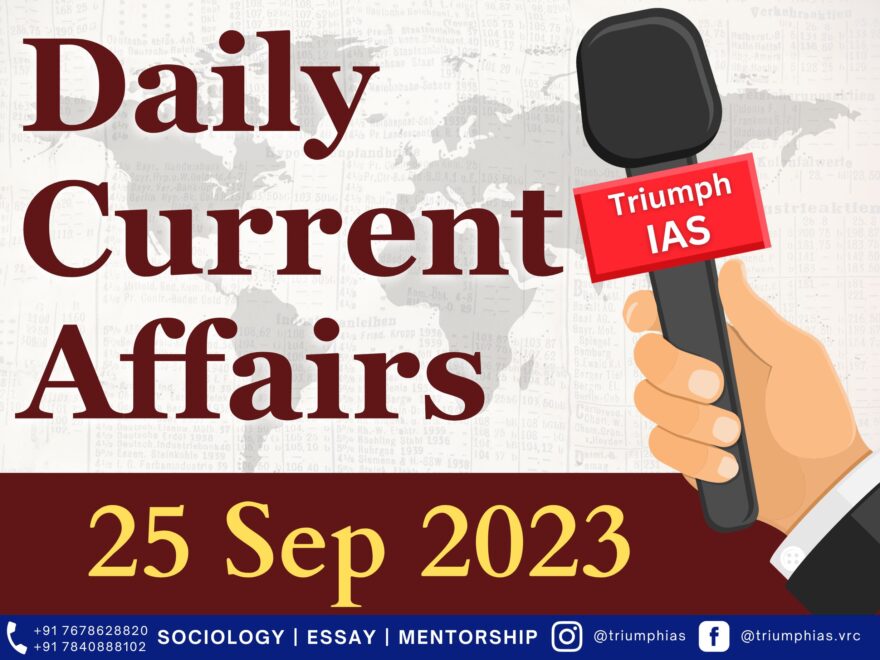
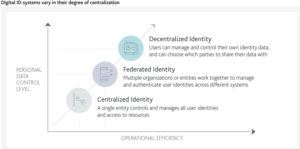
2 comments